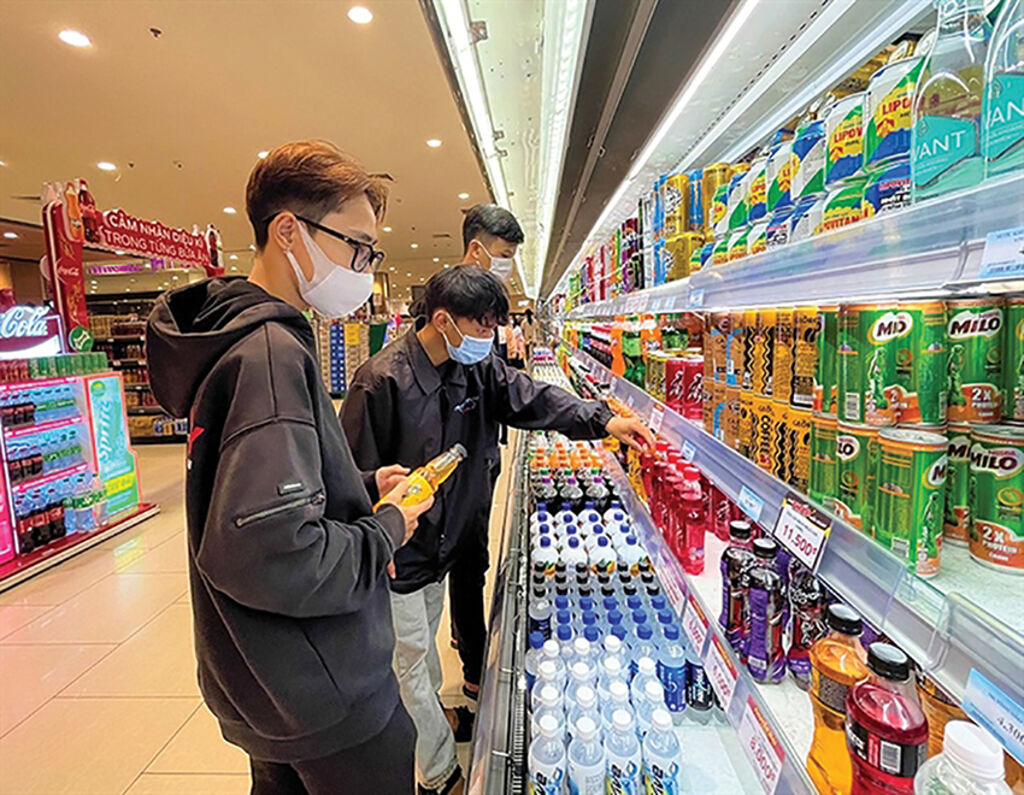 |
| Customers select to buy sweetened beverages at a supermarket in Hanoi__Photo: VNA |
The Ministry of Finance (MOF) has proposed revising the 2008 Law on Excise Tax with a focus on taxable and non-taxable objects to better align tax regulations with policies on protection of people’s health and management of high-end products and services.
Accordingly, in order to help limit sugar consumption and protect people’s health, the draft Law imposes 10-percent excise tax on sugary beverages containing more than 5g of sugar per 100ml. Exceptions may be coconut juice, milk and dairy products, fruit juice, chocolate drinks, etc. The specific list of sugary drinks not liable to excise tax would be issued by the Government.
The addition of excise tax on sugary drinks aligns with the World Health Organization (WHO)’s recommendations for Vietnam and other countries in the world.
Angela Pratt, WHO Representative in Vietnam, said a common measure used around the world to reduce harm from sugary drinks is to increase prices with taxes.
The higher cost might help reduce consumption of sugary drinks, contribute to curbing the rise in obesity rates, especially in children, and reduce the risk of non-communicable diseases in future generations, said Pratt.
Also in order to reduce alcohol consumption and related harms caused by alcohol abuse, the draft law continues to impose excise tax on liquor and beer. The tax rate is set to rise annually during 2026-30 until selling prices of alcohol products increase by at least 10 percent as recommended by WHO.
For cigarettes, cigars and other tobacco products used for smoking, inhaling, chewing, sniffing or keeping in mouth, the draft maintains the current tax rate of 75 percent and adds an absolute tax which would increase on an annual basis from 2026 to 2030. Such proposal aims to help achieve the goal of reducing the rate of tobacco use among males aged 15 or older to under 36 percent for the 2026-30 period, aligning with the National Strategy for Prevention and Control of Tobacco Harms and WHO recommendations.
A 10-percent tax rate would continue to be levied on air conditioners with a capacity of less than 90,000 BTU, except those specifically designed for means of transport such as cars, railroad cars, ships, boats and airplanes. In case indoor units and outdoor units of air conditioners are manufactured or imported separately, they would also be taxed.
The draft maintains the imposition of excise tax on luxury goods such as aircraft, helicopters, gliders and cruises for personal use, and entertainment activities such as casinos, betting and golf.
Meanwhile, aircraft, helicopters, gliders and cruises used for security and national defense purposes or for commercial transport, training, pesticide spraying, firefighting, filming, and surveying and mapping activities would not be liable to excise tax.
Excise tax would also not be imposed on passenger cars, four-wheeled motorized passenger vehicles that are not registered for circulation but only operate within the premises of historical sites, hospitals and schools and other special-use cars specified by the Government.
Noteworthily, goods imported from abroad into non-tariff areas and goods sold from the inland into non-tariff areas, except under-24 seat cars, which are currently exempt from excise tax, would become taxable under the draft.
The Government would be vested with the authority to modify the list of objects liable and not liable to excise tax in each period to align with the country’s socio-economic development.
The draft is scheduled to be passed by the National Assembly in May.- (VLLF)









